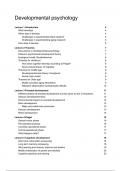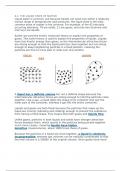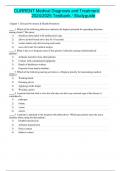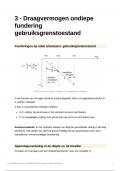Developmental psychology
Lecture 1 Introduction 4
What develops 4
When does it develop 4
Challenges in experimental infant research 5
Challenges in experimenting aging research 5
How does it develop 5
Lecture 2 Theories 7
Discussions in developmental psychology 7
Erikson’s psychosocial development theory 7
Ecological model: Bronfenbrenner. 8
Theories for childhood 8
How does cognition develop according to Piaget? 8
Socio-cultural theory of Vygotsky 9
Theories for middle age 9
Developmental task theory: Havighurst 9
Social clock model 9
Theories for Older age 9
Model succesful aging: MacArthur. 9
Selection-Optimization-Compensation-Model 10
Lecture 3 Prenatal development 11
Different phases of prenatal development (not the same as the 3 trimesters) 11
Sensory development fetus 12
Environmental impact on prenatal development 12
Brain development 13
Major post-natal brain processes 13
Sensory development 13
Motor development 14
Lecture 4 Piaget 16
Sensori-motor phase 16
Pre-operational phase 16
Concrete-operational phase 17
Formal-operational phase 17
What happens after? 17
Lecture 5 Cognitive development 18
Short term information processing 18
Long term memory processing 18
Why learning and memory improve and decline 19
Midlife (intersection of growth and decline) 20
Cognitive plasticity and training 20
,Lecture 6 Language development 21
How does language develop? 21
Intelligence 21
Role of educational facilities for development 22
How does work life change across the lifespan 22
Bilingualism 23
Lecture 7 Emotional development 24
Development in infants 24
Development in childhood 24
Development in adolescence 24
Development in adulthood 24
Development in older age 25
Lecture 8 Moral development and social cognition 26
How does morality develop 26
Development of social cognition 26
Development of social cognitive abilities 27
Empathy and prosocial behavior 27
Antisocial behavior 27
Moffitt’s theory: 28
Lecture 9 Social development 29
Attachment 29
Playing behavior 30
Social relations in childhood 30
The social life of adolescents 31
Lecture 10 Social development in adults 32
Long-term romantic relationships 32
Marriage, marital satisfaction, divorce 32
Lifestyles in midlife 32
Parenthood 32
Lecture 11 Personality 34
Temperament and personality development 34
Self concept development 35
Identity development 35
Development of self-esteem 36
Lecture 12 Family 37
Parenting styles 37
Effects of siblings, gay and lesbian families, divorcing families and reconstituted families
37
Siblings 37
Gay and lesbian families 38
Divorce 38
, Reconstituted families 38
Effects of corporal punishment 39
Effects of child maltreatment 39
Resilience can help to deal with challenges in childhood 39
, Lecture 1 Introduction
Developmental psychology is
- Sequential: several stages
- Unidirectional: earlier stages are prerequisite for later ones
- End state: higher value than the original state
- Irreversible: in progression
- Qualitative: structural transformations
- Biological growth: independent of culture
- Universal: the same for all humans
Developmental psychology deals with behavioral changes within persons across the
lifespan, and with differences between and similarities among persons in the nature of these
changes. Its aim is not only to describe these intraindividual changes and interindividual
differences but also to explain how they come about and to find ways to modify them in an
optimum way.
What develops when, how, and why?
What develops
Developmental psychology focusses on normative development and individual
differences. Eg what deviations from the norm are likely?
When does it develop
When studying normative development, we link important developmental changes to a
certain age.
There are two phases of old age (but huge differences between individuals):
1. Young old (60-80): still relatively healthy, active.
2. Old old (80-100): increased risk for physical and cognitive problems
Biological age is never responsible for changes and does not explain changes.
Changes can be correlated with age. The goal is to link changes to ‘why’.
Time scale of development: variability is the short-term changes that are more or
less reversible vs. change is more or less enduring. Variability can predict change.
We can treat change in a continuous way (correlation across time)
or compare specific age groups (mean difference between two groups).
Cohort effects
Cohort: any group that shares having experiences the same cultural environment
and historical events (eg. same year of birth).
Cohort effects: differences in developmentally relevant variables that arise from
(non-age-related) factors to which each birth cohort is exposed -> observed results
caused by cohort characteristics.
Lecture 1 Introduction 4
What develops 4
When does it develop 4
Challenges in experimental infant research 5
Challenges in experimenting aging research 5
How does it develop 5
Lecture 2 Theories 7
Discussions in developmental psychology 7
Erikson’s psychosocial development theory 7
Ecological model: Bronfenbrenner. 8
Theories for childhood 8
How does cognition develop according to Piaget? 8
Socio-cultural theory of Vygotsky 9
Theories for middle age 9
Developmental task theory: Havighurst 9
Social clock model 9
Theories for Older age 9
Model succesful aging: MacArthur. 9
Selection-Optimization-Compensation-Model 10
Lecture 3 Prenatal development 11
Different phases of prenatal development (not the same as the 3 trimesters) 11
Sensory development fetus 12
Environmental impact on prenatal development 12
Brain development 13
Major post-natal brain processes 13
Sensory development 13
Motor development 14
Lecture 4 Piaget 16
Sensori-motor phase 16
Pre-operational phase 16
Concrete-operational phase 17
Formal-operational phase 17
What happens after? 17
Lecture 5 Cognitive development 18
Short term information processing 18
Long term memory processing 18
Why learning and memory improve and decline 19
Midlife (intersection of growth and decline) 20
Cognitive plasticity and training 20
,Lecture 6 Language development 21
How does language develop? 21
Intelligence 21
Role of educational facilities for development 22
How does work life change across the lifespan 22
Bilingualism 23
Lecture 7 Emotional development 24
Development in infants 24
Development in childhood 24
Development in adolescence 24
Development in adulthood 24
Development in older age 25
Lecture 8 Moral development and social cognition 26
How does morality develop 26
Development of social cognition 26
Development of social cognitive abilities 27
Empathy and prosocial behavior 27
Antisocial behavior 27
Moffitt’s theory: 28
Lecture 9 Social development 29
Attachment 29
Playing behavior 30
Social relations in childhood 30
The social life of adolescents 31
Lecture 10 Social development in adults 32
Long-term romantic relationships 32
Marriage, marital satisfaction, divorce 32
Lifestyles in midlife 32
Parenthood 32
Lecture 11 Personality 34
Temperament and personality development 34
Self concept development 35
Identity development 35
Development of self-esteem 36
Lecture 12 Family 37
Parenting styles 37
Effects of siblings, gay and lesbian families, divorcing families and reconstituted families
37
Siblings 37
Gay and lesbian families 38
Divorce 38
, Reconstituted families 38
Effects of corporal punishment 39
Effects of child maltreatment 39
Resilience can help to deal with challenges in childhood 39
, Lecture 1 Introduction
Developmental psychology is
- Sequential: several stages
- Unidirectional: earlier stages are prerequisite for later ones
- End state: higher value than the original state
- Irreversible: in progression
- Qualitative: structural transformations
- Biological growth: independent of culture
- Universal: the same for all humans
Developmental psychology deals with behavioral changes within persons across the
lifespan, and with differences between and similarities among persons in the nature of these
changes. Its aim is not only to describe these intraindividual changes and interindividual
differences but also to explain how they come about and to find ways to modify them in an
optimum way.
What develops when, how, and why?
What develops
Developmental psychology focusses on normative development and individual
differences. Eg what deviations from the norm are likely?
When does it develop
When studying normative development, we link important developmental changes to a
certain age.
There are two phases of old age (but huge differences between individuals):
1. Young old (60-80): still relatively healthy, active.
2. Old old (80-100): increased risk for physical and cognitive problems
Biological age is never responsible for changes and does not explain changes.
Changes can be correlated with age. The goal is to link changes to ‘why’.
Time scale of development: variability is the short-term changes that are more or
less reversible vs. change is more or less enduring. Variability can predict change.
We can treat change in a continuous way (correlation across time)
or compare specific age groups (mean difference between two groups).
Cohort effects
Cohort: any group that shares having experiences the same cultural environment
and historical events (eg. same year of birth).
Cohort effects: differences in developmentally relevant variables that arise from
(non-age-related) factors to which each birth cohort is exposed -> observed results
caused by cohort characteristics.











